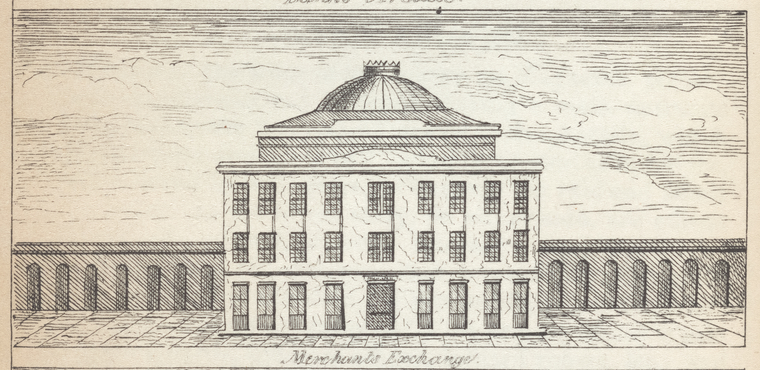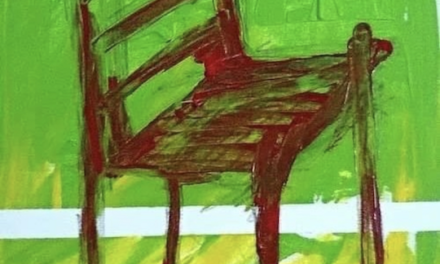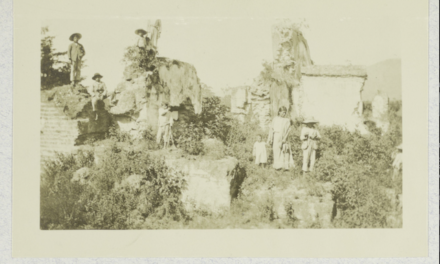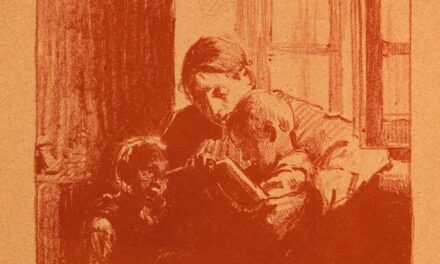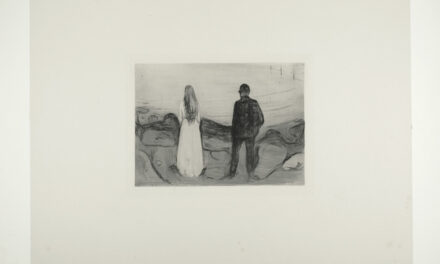Banks’ Arcade; Merchants’ Enchange; Citizens’ Bank; City Bank. 1838, The New York Public Library Digital Collections.
The Lady at the Bank
by Murzban F. Shroff
I don’t know why I hated her the way I did, but I did. Maybe it was because the first time I approached her, she was feeding a cat out of her lunchbox. What was a cat doing in a bank? And why was the lady having lunch during banking hours? All I wanted to do was to collect a new checkbook, and she was the one in charge of issuing that. But instead of attending to my request, she seemed more keen to feed the cat who sat obediently at her feet with a bored, haughty expression. From time to time, the cat would open its mouth in a whiskery yawn, and the lady would bend down to feed it using that same hand to scoop out food for herself from her own lunchbox to eat. God, it was disgusting. And I felt the first stirrings of dislike.
I have had an account with this bank ever since I first started working. My grandfather had opened the account for me by depositing a princely fifty-one rupees for good luck. “Good fortune be with you,” he said handing me a passbook, a checkbook, and smiling in that knowing way of his. I was very close to my grandfather, a tall regal man of remarkable composure, who advised me to always live within my means. By minimizing his own needs and keeping himself free of anger and from what he called “toxic emotions,” my grandfather had lived until the ripe age of ninety-six. So, my relationship with the bank was hardly based on commerce or service or performance but more upon sentiment, I should say. After all, there were no tangible reasons to prefer this bank over any other. It hadn’t changed its furniture in years. There was an automated teller machine, but it seldom worked. The printer, since it had never been upgraded, squeaked plaintively while printing out passbook entries in a faint, almost unreadable type, the quality of which was so poor that every year my accountant would throw up his hands in exasperation, “How am I to discern these entries? How am I to prepare your tax returns?”
I would bring this to the attention of the manager, who would be contrite and apologetic. “What to do, sir?” he would say. “ I am asking the management every time for a new printer but they say there is no budget. You tell me, sir, what I am to do?” His eyes would dim with shame, and then he’d look at me for approval, for support. Poor man, I would think, the understanding he cannot get from his management, he expects from me.
The manager’s cabin was a glass partition covered with loud and splashy colored posters of various finance schemes that invited customers to purchase new homes and cars, to apply for education loans, small business loans, health insurance, and loans against shares. “The one-stop bank for all your needs,” read one poster. Another: “We don’t build assets, we build relationships.” While the manager had a cabin, all the other employees worked in the open quadrangle behind small partitions. But, the worst thing about this bank was the queue at the cash withdrawal counter. It was always long and slow moving. And, so, the lady in question.
I don’t know exactly why I hated her with the intensity that I did, but I did. Was it because she gave the cat priority over me, an old customer short on time, shorter still on patience? It was a kind of dull aversion that critiqued everything in her appearance and manners: Her creased sari, her languid walk, her attachment to that old lunchbox she carried around in this clingy sort of a way, her look of utter incomprehension when she spoke to customers and then her expression of delight when she addressed her colleagues. Still, did that give me the right to feel the way I did?
My dislike grew, when one day, I came upon her at the cash withdrawal counter and I found her, as usual, chatting with a colleague about the events of a popular TV serial. Behind me, senior citizens and other customers were languishing in a long queue. There was no air conditioning and no place for anyone to sit. In between her leisurely chitchat and attending customers, she would nibble at a vada dipped in thick, white chutney, and then slowly wipe her chutney stained fingers against the rim of the plate. I told myself, again, that this was no reason to dislike her. But when it came my turn to collect the cash, I saw her raise a forefinger to her tongue, wet it, and proceed to squeeze out rupee notes from a tightly packed bundle.
That was it! My voice raised, You are abusing Laxmi, you are being disrespectful to the Goddess! The money you have defiled is nothing less than Laxmi, the Goddess of Prosperity, who resides in these notes, who sanctifies them! You are abusing Laxmi, and you are being disrespectful to the Goddess!
Though shocked by my own outburst, I enjoyed seeing her sudden discomfort and I relished the attention of the other customers gathering to my side. Some who had been waiting a long time in the queue suggested that I should let things pass, that surely, the lady had learned her lesson. But I was not so sure of that. Under her lowered eyes, I could see her resentment, and I knew that she could have easily wished me away under a bus or a train.
But on this particular morning, I arrived at the bank in a tearing hurry needing to make an urgent cash withdrawal before heading to work. And, pray, what do I see? The “deposits” and “withdrawal” counters are empty! The women are seated at their desks, their backs to the computer screens; the men are standing or leaning against their desks. In the center of the branch, in the middle of the open quadrangle, the manager is addressing his staff, who have stopped working and are listening to him, enrapt. The manager, all charged up, is a short, stocky man with a delicate swell of belly. His clothes are neat, his shirtsleeves are buttoned down to the wrists. His tie, a vivid orange and red, stands out like a table napkin against the white of his shirt. His black trousers are evenly pressed and his shoes are polished to a gleam. To the side is a tall hefty security guard holding up a cell phone as though an expert cameraman filming the manager as he speaks.
The manager, it seems, has attended a meeting with his bosses, the details of which he is sharing with his staff. “So, the Management speaks to me about customer service,” he says. “They want us to be number one. Among all nationalized banks, we should lead. And I say to them, why customer service? That is the right of every customer. The minute you become a customer, do you not automatically have a right to service? I say to them, now the time has come to talk about customer “delight” and customer “retention.” Because why be number one, if we are not going to stay there?” His eyes flicker over the audience, and on cue, his staff applauds.
Pleased, the manager continues: “They, the Management, tell me that they want to appoint relationship managers in every branch, and that I should decide who among you will make the best relationship manager. And I say to them, sorry, I cannot do that. Because in my branch every employee is a relationship manager; her or she knows the value of every customer. We make every customer feel special, feel at home.” He suddenly pivots about and says to the customers present, “Come, sir, madam, tell me: am I not right? Do you not feel this is your bank? You are the owners and we are your humble servants?” Some of the customers nod politely, and the bank manager beams proudly. At which point I look around, and that’s when I see her, the object of my aversion. She is standing off to the side, a few feet from the cash window, chewing on a paratha. Edging closer to her, I whisper, “Madam, I need to make an urgent cash withdrawal. Can you please do it for me?” She stays me with wrinkled fingers, while she gulps down her paratha. Then she peers at me disapprovingly, as though I were mad, and says, “Hush, can’t you see? Sahib is speaking. He is saying important things. We cannot interrupt him. We cannot be rude. Let him finish. Then I will help you. Okay?”
And then I knew. It was not so much her that I disliked as it was the bleak apathy that had settled into the face and body language of every person who had worked too long in a sahib-dominated culture, who took their bosses as their gods, their customers as their burden, and their jobs as an imposition that threw up their shortcomings. It was a face I would see ever so often. At the police station where I went to report loud, blaring street music and noisy fireworks. At the telephone exchange where I went to complain about my internet connection failing. At the electricity board where I protested the illegal wiring and connections in my neighborhood. At the municipality where I went to bemoan a water problem or an illegal encroachment and where I was advised to tolerate, to adjust.
“Adjust” was a word that crept up with alarming frequency in my overpopulated country. It would forgive every aberration, soothe every inconvenience, take the conflict out of every dispute, and build bridges where none could exist. I finally understood and having understood, I nodded at the lady with conspiratorial ease. But at that moment, she dipped her hand into the lunchbox and thrust towards me with her oily fingers a rolled paratha daubed with a little pickle. Thanking her, I made some excuse and apologetically declined for, in truth, it was an offer I would never accept.
Murzban F. Shroff has published his fiction with over fifty journals in the U.S. and UK. Six of the stories have garnered a Pushcart Prize nomination; one has been the recipient of the John Gilgun Fiction Award. His debut fiction collection, BREATHLESS IN BOMBAY, was shortlisted for the 2009 Commonwealth Writers’ Prize in the best debut category from Europe and South Asia. The work received a high degree of critical acclaim from forums like Publishers Weekly, Kirkus Review, Booklist, The Huffington Post, and the BBC Asian Network. It featured fourth in the Guardian listing of Top Ten Mumbai books. Shroff’s novel, set in contemporary Mumbai, is slated for an end-of-the-year release. He can be contacted on murzbanfshroff@gmail.com

